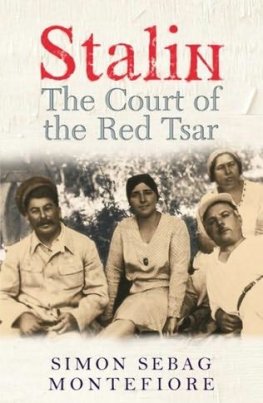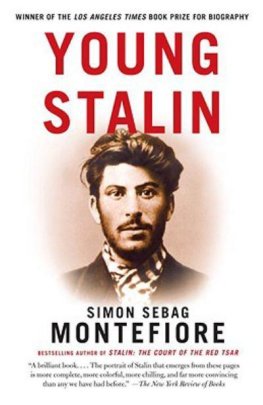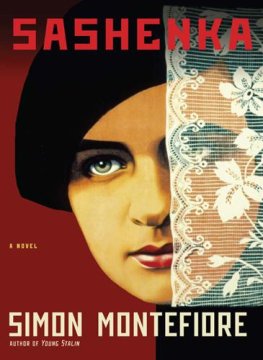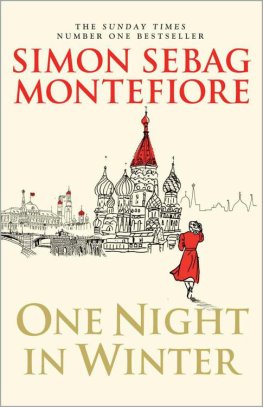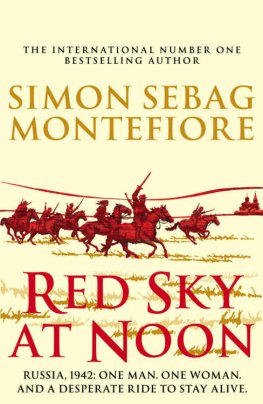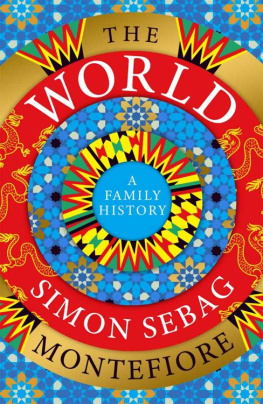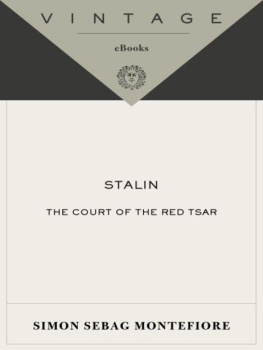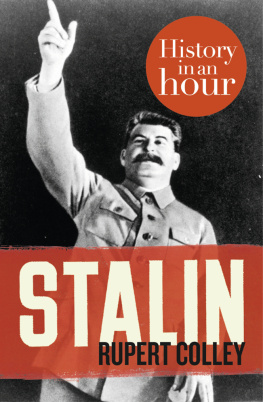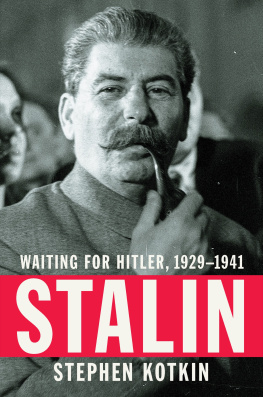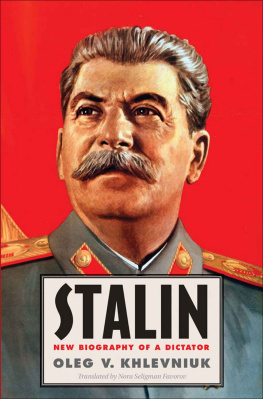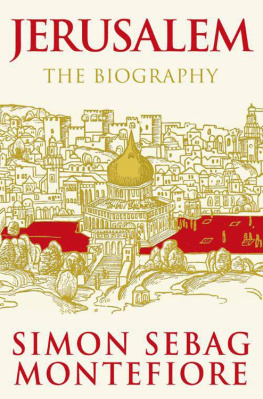Simon Sebag Montefiore
STALIN
The Court of the Red Tsar
Praise for Simon Sebag Montefiores STALIN
A marvelously well-researched book. Montefiore has written a supremely important book about Joseph Stalin, a biography that other scholars will find hard to equal. This is sure to be one of the outstanding books of the year.
St. Louis Post-DispatchUltra reader-friendly, lively, gossipy and packaged with revelations about the intimacies and intrigues of Stalin the man and his courtiers. Brilliant.
Evening Standard Book PageA book that had to be written. Montefiores biography is far different from anything in this genre. A superb piece of research and frighteningly lucid.
The Washington TimesGripping and timely. Montefiore has illuminated wider aspects of the history of the USSR. This is one of the few recent books on Stalinism that will be read in years to come.
Robert Service,
The Guardian (London)
Montefiore combines his research among the primary sources and the fruits of his interviews into a focused, gripping story about a man, who, along with Mao, Hitler and Genghis Khan, has to be in the running for historys greatest mass murderer.
Pittsburgh Post-Gazette[A] masterful and terrifying account of Stalin as seen within his close entourage. Seldom has the picture been put in finer focus than by Montefiore.
Alistair Horne,
The Times (London)
Horrific, revelatory and sobering. A triumph of research.
John le Carr,
The ObserverI loved the totalitarian high baroque sleaze of Simon Sebag Montefiores Stalin. One of the 2004 Guardian Books of the Year.
Simon Schama,
The Guardian (London)
A grim masterpiece shot through with lashes of black humor. The personal details are riveting.
Antonia Fraser,
Mail on SundayA well-researched and insightful book. The narrative adroitly catches the atmosphere of the time.
Los Angeles Times Book ReviewI did not think I could learn anything new about Stalin, but I was wrong. A stunning performance.
Henry Kissinger
An extraordinary book and Simon Sebag Montefiore might well be one of the very few people who could possibly have written it. For anyone fascinated by the nature of eviland by the effects of absolute power on human relationshipsthis book will provide insights on every page.
Anne Applebaum,
Evening StandardMontefiores deft combination of biography and history brings Stalin alive, so that he becomes as complex and contradictory as any of the great characters in fiction.
The New York SunIf you plan (wisely) to read only one book about Joseph Vissarionovich Stalin, let it be Stalin: The Court of the Red Tsar. Simon Sebag Montefiore, writing with the skill of a novelist has based his highly readable biographical thriller solidly and factually not only on all of the preceding scholarly studies of the Soviet dictator but also upon newly available archival materials.
The Seattle TimesA large and ambitious overviewand under-viewof the Soviet leaders life and epoch, drawn from an impressively wide array of Russian sources.
The Atlantic MonthlySpectacular. An impressive and compelling work, using important new documents.
The SpectatorSebag Montefiore has done a valuable service in drawing our attention to a hitherto little-studied aspect of Stalinism. As his Stalin demonstrates, the personal relationships of those who ran the Kremlin provided an essential dynamic for the development of the Stalinist system. Isolated from the masses, these members of the privileged elite depended on one another for emotional sustenance to an extraordinary degree.
The Times Literary Supplement (London)
Introduction and Acknowledgements
I have been helped generously by many people in this enterprise from Moscow and St. Petersburg to Sukhumi, from Tbilisi to Buenos Aires and Rostov-on-Don. My aim here was simply to write a portrait of Stalin, his top twenty potentates, and their families, to show how they ruled and how they lived in the unique culture of his years of supreme power. This does not pretend to be a history of his foreign and domestic policies, his military campaigns, his youth or the struggle with Trotsky. This is a chronicle of his court from his acclamation as the leader in 1929 to his death. It is a biography of his courtiers, a study of high politics and informal power and customs. In a way, this is a biography of Stalin himself through his relationships with his magnates: he is never off-stage.
My mission was to go beyond the traditional explanations of Stalin as enigma, madman or Satanic genius, and that of his comrades as men without biographies, dreary moustachioed sycophants in black-and-white photographs. Deploying the arsenal of new archives and unpublished memoirs, my own interviews, and well-known materials, I hope Stalin becomes a more understandable and intimate character, if no less repellent. I believe the placing of Stalin and his oligarchs in their idiosyncratic Bolshevik context as members of a military-religious order of sword-bearers explains much of the inexplicable. Stalin was utterly unique but many of his views and features, such as dependence on death as a political tool, and his paranoia, were shared by his comrades. He was a man of his time, so were his magnates.
Molotov and Beria are probably the most famous of them but many are not well known in the West. Yezhov and Zhdanov gave their names to epochs yet remain shadowy. Some, such as Mekhlis, have hardly been covered even by academics. Mikoyan was admired by many; Kaganovich widely despised. They may have presented a grey mask to the outside world but many were flamboyant, dynamic and larger-than-life. The new access to their correspondence and even their love letters will at least make them live.
In telling their stories, this is inevitably a cautionary tale: of the many mass murderers chronicled here, only Beria and Yezhov were prosecuted (and not for their true crimes). The temptation has been to blame all the crimes on one man, Stalin. There is an obsession in the West today with the cult of villainy: a macabre but inane competition between Stalin and Hitler to find the worlds most evil dictator by counting their supposed victims. This is demonology not history. It has the effect of merely indicting one madman and offers us no lesson about either the danger of utopian ideas and systems, or the responsibility of individuals.
Modern Russia has not yet faced up to its past: there has been no redemption, which perhaps still casts a shadow over its development of civil society. Many modern Russians will not thank me for the intimate frankness of a history they would prefer to forget or avoid. While this book certainly does not diminish Stalins paramount guilt, it may discourage the convenient fiction of his sole responsibility by revealing the killings of the whole leadership, as well as their own sufferings, sacrifices, vices and privileges. In this chronicle of villains, the only heroes are a few brave poetsand a multitude of forgotten ordinary people.
I have been enormously fortunate in those who have helped me: this book was inspired by Robert Conquest, who has been the most patient, generous supporter and adviser throughout. I am superlatively grateful to Robert Service, Professor of Russian History, Oxford University, who has supervised my book with generous encouragement and outstanding knowledge, and whose detailed reading and editing of the text have been invaluable. In Russia, I have been supervised by the most distinguished scholar of Stalinist high politics, Oleg Khlevniuk, Senior Researcher at the State Archive of the Russian Federation (GARF) who has steered and helped me throughout. I am fortunate too that on matters of the NKVD/MGB, I have been helped by Nikita Petrov, Vice-Chairman of Moscows Memorial Scientific Research Centre, the finest scholar of the secret police working in Russia today. On military matters, I was guided and helped, in both interpretation and archival research, by Professor Oleg Rzheshevsky and his associates. On diplomatic questions, I have treasured the knowledge, checking and charming acquaintance of Hugh Lunghi, who attended Teheran, Yalta and Potsdam, and meetings with Stalin during the later 1940s. Sir Martin Gilbert has been generous with both his knowledge and contacts in Russia. On Georgian matters, my guides have been Zackro Megrelishvili, Professor (American Studies), Tbilisi Ilia Chavchavadze State University of Language and Culture; and Gela Charkviani. On Abkhazian affairs, I must thank the top scholar in Sukhumi, Professor Slava Lakoba. I am also grateful for the guidance and ideas of the following: Geoffrey Hosking, Professor of Russian History at the University of London; Isabel de Madariaga, Professor Emeritus of Slavonic Studies at the University of London; and Alexander Kamenskii, Professor of Early and Early-Modern Russian History at Moscows Russian State University for the Humanities. Roy Medvedev, Edvard Radzinsky, Arkady Vaksberg and Larissa Vasilieva also advised and helped me. I am most fortunate to be aided by such a towering cast and I can only humbly thank them; any wisdom is theirs; any mistakes my own.

